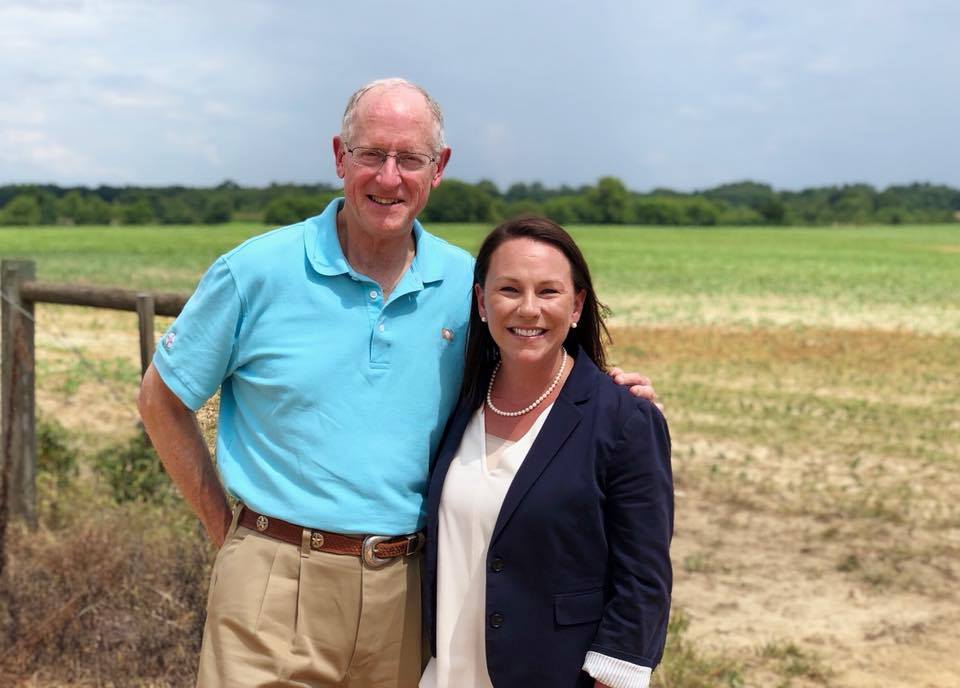Martha Roby: Touring southeast Alabama farms with Ag Chairman Mike Conaway

With Congress recently out of session for the Independence Day district work period, I took the opportunity to travel throughout Alabama’s Second District to share an update from Washington and hear directly from the people I represent. I spent time in Clayton, Eufaula, Andalusia, Montgomery, Troy, Slocomb, and Brundidge, just to name a few. Throughout my recent time on the road, one issue that came up frequently was agriculture policy, and I was glad to be able to share a timely update about the lay of the land as it relates to farm policy. During one day of this district work period, I had the privilege of hosting House Agriculture Committee Chairman Mike Conaway (R-TX) and his wife Suzanne for an agriculture tour of Alabama’s Second District. Together we held a large farmers’ roundtable discussion in conjunction with the Alabama Farmers Federation at the Pike County Cattlemen Association in Troy. This was a truly valuable opportunity for the farmers I represent to ask questions and get some answers. During the roundtable, we had conversations about the status of expanding access to rural broadband, possible solutions for our country’s feral hog problem, the importance of strict work requirements for welfare recipients, maintaining a strong crop insurance program, and more. After the roundtable, Chairman Conaway and I visited two family farms in Coffee and Geneva Counties for tours and briefings on their respective crops and operations. In Coffee County, we stopped by a beautiful farm that produces a variety of crops, including peanuts, cotton, and corn. In Geneva County, we visited a cotton farm that just recently planted a crop in early June. Chairman Conaway’s visit comes during a key time for agriculture policy in this country. As you may know, the House and Senate have passed our own different versions of the farm bill, and we will soon go to conference committee to work out the differences. In the House, we passed a conservative farm bill that includes strict work requirements for welfare recipients. I believe it’s important that we offer assistance to the most vulnerable Americans when they truly need it while providing tools to help them improve their circumstances. I have always said that we absolutely must encourage able-bodied individuals to work instead of incentivizing them to remain dependent on the federal government. The House farm bill reflects our conservative position on this issue, and I was proud to support it. Since the Senate is currently bound by a 60-vote threshold to pass legislation, their farm bill is considerably different than our version and doesn’t include conservative work requirements. When we go to conference to work through our differences, the bill that we ultimately pass will likely be a mixture of both versions. As I told the farmers in southeast Alabama, I am eager to continue working alongside my colleagues in Congress to get the work done and send a smart, strong farm bill to the President for his signature. I deeply appreciate Chairman Conaway and his wife Suzanne for making themselves available to the farmers I represent. We were able to have many one-on-one conversations with the hardworking men and women who are impacted by agriculture policy each and every day. I am also grateful to every farmer who attended the roundtable, asked meaningful questions, and hosted us on their properties. As Chairman Conaway said, “The decisions are made by the people who show up.” Thanks to the farmers who showed up, our day of agriculture policy discussion was very successful. I will continue to work alongside the Chairman and my colleagues to deliver agriculture policy that gives fair treatment to our Alabama commodities while making the farmers’ work easier, not more difficult. At the end of the day, my goal is for our farm bill to enable the farmers I represent to do the work they do best: provide the food and fiber that feeds our state, our country, and the world. ••• Martha Roby represents Alabama’s Second Congressional District. She lives in Montgomery, Alabama, with her husband Riley and their two children.
Twinkle Andress Cavanaugh: We have a lot to be thankful for in Alabama

This is always one of my favorite weeks of the year. As we gather to give thanks for and with our loved ones, 396 years since the first Thanksgiving, this week also marks the 62nd annual National Farm-City Week. It is only fitting that we celebrate both of these occasions at the same time. After all, the early settlers came together to rejoice over a successful harvest that would sustain their colony. The Thanksgiving experience certainly has changed over the years, but Farm-City week gets us back to our traditional roots. We can sometimes lose sight of this in modern times, but farmers work diligently year-round to put food on our tables. We owe them a tremendous debt of gratitude. Without them, we could not enjoy our American way of life. For some context, my brother and I were “the city cousins” growing up. Our grandparents on both sides of the family were farmers; my dad’s parents were poultry farmers (really they called themselves “chicken farmers” back then) in Crenshaw County, and my mom’s parents grew soybeans, cotton, and peanuts and had a small herd of cattle near the line between Pike County and Bullock County. We would spend our time at one of the two farms during the summer, on weekends, and for holidays. However, unlike our cousins, we lived in the city because my parents moved to town so they could both teach school. While we were fortunate enough to experience life both on and off the farm, most families only know one of the two lifestyles. That’s why since 1955, this week has been designated as National Farm-City Week. It is the time of year when we focus on increasing understanding between people on and off the farm. You really do not know what it’s like to be in someone else’s shoes until you have walked in them. To that end, the Alabama Farm-City Committee does a tremendous job throughout the year providing educational programs and first-hand experiences to bridge the gap and increase understanding. Even with these differences between farm and city life, rural and urban communities rely heavily on each other for their livelihood. On one hand, farmers work diligently to produce high-quality food, fiber, and forest products for everyone to enjoy. Getting these products from farms to homes across the state, country, and world requires cooperation with people across many industries and walks of life. There are manufacturing and distribution aspects of agriculture, too. Grocers, truck drivers, factory workers, computer scientists, bankers, veterinarians, chemists, salesmen, and various others all play vital roles in getting agriculture products from the farm into households worldwide. The increased understanding that stems from Farm-City programs leads to better cooperation and a stronger economy. This is a boon for families across our great state. Overall, the positive effect that agriculture has on Alabama year-round is truly unparalleled. While the most direct impact is reflected in this year’s Farm-City Week theme, ‘Agriculture: Food for Life,’ there are many lesser known “ag facts” that I would like to share. For instance, farmland covers approximately a quarter of our state and forestland covers two-thirds. This provides a significant benefit when it comes to ecosystem services. Second, Alabama is home to around 43,000 farms, most of which are family owned and operated. The influence goes way beyond these families, as nearly 600,000 Alabama jobs are dependent on agriculture. Between agriculture, forestry, and related industries in Alabama, the annual economic impact is over seventy billion dollars. This does not even include the social benefits of agriculture in our state. Alabama farmers are pillars of their local communities who are giving of their time, talent, and resources. They practice a core belief of mine in all of their work: doing more with less. From my personal experience, life on the farm builds character. The scorching-hot summers I spent working in my grandparents’ chicken houses, my shoes caked with chicken litter as I bustled about trying to keep the chickens from killing each other, helped teach me the virtues of hard-work. This has stuck with me throughout my life, and I am forever grateful for my time on the farm. Which brings us back to Thanksgiving. Let’s challenge ourselves this year. We have so many things to be thankful for in Alabama. But all we see in the news is negative. Let’s count God’s blessings and highlight the things that we love about our state. Most importantly, we still live in a state of God-fearing people. We are also blessed to have an abundance of natural resources in Alabama. We have the most navigable waterways in the country, allowing goods to flow in and out of the state. We have a huge supply of coal that provides jobs for so many families and helps keep electricity rates low for everyone. Our beautiful land and bodies of water make our state a premier destination for hunting and fishing. Alabama is also blessed to have tremendous farmland, ranging from the dark fertile soil in the Black Belt to the bountiful Tennessee Valley. The unemployment rate just hit an all-time low, and we are moving in the right direction with workforce development. Our manufacturing sector is thriving, with new companies making Alabama home left and right. And so, so much more. We are truly blessed, and I am proud to call Alabama home. Happy Thanksgiving and happy Farm-City Week! Our state’s great farmers work hard so that we can focus on our families and enjoy cherished traditions this Thanksgiving Day. So, if you see a farmer during the holiday season, be sure to thank them. This week and throughout the year, we should be grateful for everything they do. When you are saying your prayers, please ask God to continue blessing our farmers and our great state. ••• Twinkle Andress Cavanaugh is the President of the Alabama Public Service Commission. Opinions expressed do not represent the position of the Public Service Commission or its other commissioners.
Martha Roby: Jeff Sessions is the right pick for Attorney General

Alabama got the news many were anxiously anticipating late last week when President-elect Donald Trump announced he would nominate our own Senator Jeff Sessions to be Attorney General of the United States. There is no one more capable and qualified to serve our country as Attorney General than Senator Jeff Sessions. While he is mostly known for his conservative record in the Senate, Senator Sessions also brings significant prosecutorial experience to the job. He served as a United States Attorney in the Southern District of Alabama for 12 years and was Attorney General of Alabama before being elected to the Senate. President-elect Trump has selected a leader with remarkable depth of knowledge and experience who cares deeply about Americans and will fight for what’s right. I’m very proud for Senator Sessions on this achievement. He’s been a kind mentor to me, and I have valued his guidance and leadership over my six years in Congress. Senator Sessions has been a dedicated fighter for the conservative cause for many years now, and no one deserves this honor more. I do hate that we will lose him in the Legislative Branch, but I’m confident that this new role will enhance his ability to change our nation’s course for the better. Unfortunately, but unsurprisingly, critics started attacking Senator Sessions’ record and character even before his nomination was confirmed. These attacks are unfair and without merit. It’s really a shame that anyone would attempt to tarnish the name of such a good man. We’ve seen these attacks before. Washington liberals kept Senator Sessions from an appointment to the federal bench during the Reagan Administration using these same tactics. I’m reminded of former Senator Arlen Spector who said that in all his years of service the vote he regretted most was the one he cast not to confirm Jeff Sessions for the bench. He said that because he came to know Jeff Sessions and understand his character. I’m also reminded of how Senator Sessions made it a point to be in Selma for the 50th Anniversary of “Bloody Sunday,” joining arms with Rep. John Lewis and other leaders to cross the Edmund-Pettus Bridge. That was an important day for Alabama, and he knew how meaningful his presence and participation were. I doubt many of his critics know him or have even met him. I do know Jeff Sessions, and I know him to be a man of the highest character and integrity. He probably has a better understanding of the rule of law than anyone in elected office. He’s going to make a tremendous Attorney General, and I believe that in time his critics will be proven wrong. ••• Martha Roby represents Alabama’s 2nd Congressional District. She lives in Montgomery, Alabama with her husband Riley and their two children.


